The Japanese skating juggernaut rolled into The Hague last week for the Challenge Cup and left town on Monday with a total of five golds medals in an impressive show of dominance.
Rika Kihira, Sota Yamamoto, Yuhana Yokoi, Shun Sato and Sara Honda all topped the podium in their respective disciplines as the Hinomaru was raised often at the four-day event.
Honda, the 11-year-old who is the youngest sister of 2016 world junior champion Marin, got the festivities started on Friday by winning the advanced novice women's event.
Later the same day, Yokoi and Sato captured the junior women and men's titles, respectively.
Sota Yamamoto claimed the senior men's crown on Saturday, with Yuma Kagiyama taking second place.
Kihira, the Grand Prix Final champion, rounded out the medal haul on Sunday with a victory in the senior women's competition, with Wakaba Higuchi earning the bronze.
Though the Challenge Cup fields were not highly competitive, the bottom line is that the Japan team traveled a long way to an international meet and totally controlled it.
Kihira, the favorite to win the world title next month in Saitama, looked unsettled in victory, landing just a single triple axel in the triumph.
She did a double axel in her short program to "Clair de Lune" and landed her first triple axel in her free skate to "A Beautiful Storm," but doubled her second planned triple axel.
Kihira under-rotated the back end of her triple flip/triple toe combination jump in the short program and also botched her combination spin. Despite the miscues, Kihira was in second place behind American Amber Glenn heading into the free skate.
The 16-year-old from Nishinomiya, Hyogo Prefecture, ended up easily winning on Sunday with a total score of 208.34 points over American Starr Andrews (187.69). Higuchi was third with 186.24.
Kihira seems to be struggling with her confidence now with the triple axel, especially in the short program. The pattern this season has been that she misses it in the short, then comes back with both triple axels, or at least one, in the free skate.
With the likes of Kaori Sakamoto and Russia's Alina Zagitova and Sofia Samodurova in the running to win the world title, time is running short for Kihira to get it together. The way she skated her programs in the Netherlands is not going to get her to the top of the podium at the worlds.
Yamamoto's victory was inspiring, as he continues his comeback from two serious ankle injuries. He landed a very nice quad toe loop and hit eight triples in his free skate to "Nobunaga Concerto" to win comfortably with a tally of 253.87 ahead of Kagiyama (218.02)
Yokoi (179.90) won by more than 50 points over Germany's Maria Aimee Renne (124.06). Japan's junior champion executed seven triples in her free skate to "The Phantom of the Opera."
Sato cruised to victory with a mark of 199.84, easily outdistancing Germany's Daniel Sapozhnikov (151.17). The 15-year-old from Sendai attempted two quads in his free skate, but doubled his opening salchow, then put his hand down on the front end of his quad toe/triple toe combo before falling on the back end of it.
Honda's winning score was 124.07, which put her well ahead of Belgium's Nina Pinzarrone (101.16) in second place.
Japan men's novice champion Sora Tarumi (105.70) collected the bronze medal in the event won by American Daniel Martynov (123.80).
Leonova's take on Kihira
Ice Time isn't the only one who has noticed Kihira's vulnerability of late. Former world silver medalist Alena Leonova, in recent comments to the Russian website sportsdaily.ru that were translated and posted on fs-gossips.com, gave her view on how her compatriots could beat Kihira at the worlds.
"I think it is possible. As practice shows, she is not a consistent girl," Leonova was quoted as saying. "Especially in the short program, not everything goes well there, and then she pulls herself out in the free. Of course, Kihira is a very strong athlete, but with clean performances of both programs our girls should place higher."
Kihira has repeatedly shown the ability to land the triple axel, so the recurring problem in the short program has to be mental. She has had problems with her left boot this season, but that isn't going to matter to the judges next month. She is likely going to need all three triple axels to win the worlds.
Orser speaks on Medvedeva
Brian Orser had some interesting insights on his work this season with two-time world champion Evgenia Medvedeva, who left her longtime coach Eteri Tutberidze after last season and moved to Toronto.
Orser was asked by Russian website rg.ru if he realized the Olympic silver medalist's path would be so difficult.
"I can't answer for Zhenya. But I knew that for me it would be a challenge," Orser was quoted as saying in a translation posted on fs-gossips.com. "And I'm not going to give up. I already see that something is starting to turn out."
Orser noted that his work with Medvedeva is a process.
"It takes time to achieve the desired result," Orser stated. "Zhenya must survive the transition from girlish skating to the skating of an adult girl. When she was 15-16 years old, she literally won every competition, victories went one after another.
"Now at 19, this is not happening. However, I believe that she understands why. Zhenya goes through the process of renewal, if want you can call it rebirth."
Orser cited the challenges Medvedeva faced with her move to Canada.
"She is getting used to the changes: in physiology, technique, coaching system, environment, life in another country after all," Orser commented. "But she is very patient and I'm grateful to her for this."
ISU requests 2022 bids
The ISU requested applications from member federations last week for both the 2022 world championships and the 2022 world junior championships. The deadline for submissions is April 15 of this year.
The 2022 worlds will be just a few weeks after the 2022 Beijing Olympics, and the post-Olympic worlds are always overshadowed by the preceding extravaganza, so they don't provide much appeal.
However, the world juniors are another matter. In the 43-year history of the event, Japan has hosted it just once — in 1984 in Sapporo — when a 14-year-old Midori Ito took home the bronze medal.
That fact it has only been held here one time seems hard to believe considering the interest in the sport in the present day.
Ice Time thinks it is time for the JSF to make a bid to bring the world juniors back to Japan. Too often the world juniors draw very sparse crowds, which certainly would not be the case here.



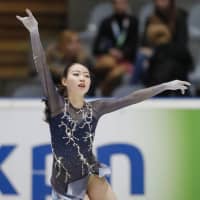
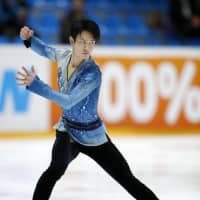
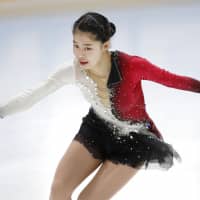
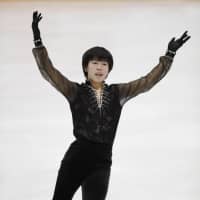
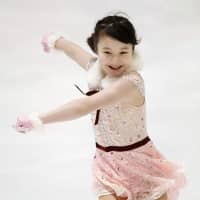












With your current subscription plan you can comment on stories. However, before writing your first comment, please create a display name in the Profile section of your subscriber account page.